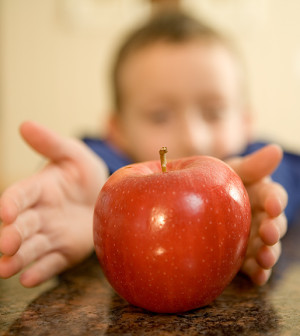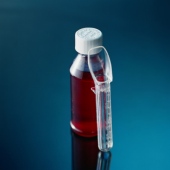- Could Artificial Sweeteners Be Aging the Brain Faster?
- Techniques for Soothing Your Nervous System
- Does the Water in Your House Smell Funny? Here’s Why
- Can a Daily Dose of Apple Cider Vinegar Actually Aid Weight Loss?
- 6 Health Beverages That Can Actually Spike Your Blood Sugar
- Treatment Options for Social Anxiety Disorder
- Understanding the Connection Between Anxiety and Depression
- How Daily Prunes Can Influence Cholesterol and Inflammation
- When to Take B12 for Better Absorption and Energy
- Epsom Salts: Health Benefits and Uses
Avoid Medication Overdoses in Children


Medications for children — even those you can buy over-the-counter — can be dangerous if a child is given too much, one expert says.
That’s why pharmacist Sheila Goertemoeller, of the Cincinnati Drug and Poison Information Center, wants parents and other caregivers to know how to safely administer these drugs.
Before giving medication to children, parents should carefully read the instructions first and use the appropriate measuring device to prevent accidental overdoses, cautioned Goertemoeller.
These precautions are especially important if you’re giving medicine to a sick child in the middle of the night, Goertemoeller noted.
Dosing errors are made by 41 percent of parents, according to research from the American Academy of Pediatrics. Just taking a few minutes to turn on a light and read the directions will help ensure children get the right amount, Goertemoeller said.
After giving children medication, it’s also important to put it away safely, she cautioned. Leaving any medication out where children can get to it could lead to a possible overdose or cause confusion among parents who are unsure if their children have received their next dose.
There are other steps parents can take to prevent accidental drug overdoses involving children, Goertemoeller added. Among these safety precautions:
- Measure. Do not let children drink medicine directly from the bottle – even if it’s a so-called natural remedy. All medications need to be dosed properly.
- Don’t grab a teaspoon. Spoons come in all shape and sizes, leaving a lot of room for error. Use the measuring device that comes with the medication. A good way to make sure this device doesn’t get lost is to keep it stored with the medication in the original box. Parents can also keep track of their children’s doses by marking them down directly on the box or using one of the many apps available to help people monitor medication use.
- Don’t guess kids’ weight. The dosing instruction on medications formulated for children are based on their weight. Dosages may vary among children of different sizes and ages. To give their children the proper dose of medicine, parents need to know how much their children weigh.
- Re-read the label. Every time parents give their children medication they should read the instructions on the bottle or package to avoid errors, particularly when they are tired.
- Keep medication out of children’s hands. Many pediatric medications are flavored to make them taste better to children. In some cases, these medications may seem more like treats to kids. Parents should be sure to store all medications out of the reach of little hands to avoid a possible overdose. Ideally, it should be kept in a locked box or cabinet. Parents should never refer to medicine as “candy,” which could tempt kids to try to take more than they should.
- Use an alarm. Busy parents may sometimes forget a dose of their children’s medication. During a hectic day, an alarm can serve as a helpful reminder to give kids their medicine on time.
- Safety first. Parents should consider putting the Drug and Poison Information Center number, 1-800-222-1222, in their cell phones. This number can also be placed near home phones. In the event of an emergency, having this number handy will enable parents to get help more quickly.
More information
The U.S. Food and Drug Administration provides more information on giving medication to children.
Source: HealthDay
Copyright © 2026 HealthDay. All rights reserved.










